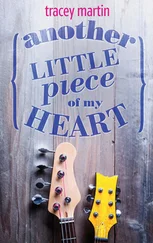Richard Ford - A Piece of My Heart
Здесь есть возможность читать онлайн «Richard Ford - A Piece of My Heart» весь текст электронной книги совершенно бесплатно (целиком полную версию без сокращений). В некоторых случаях можно слушать аудио, скачать через торрент в формате fb2 и присутствует краткое содержание. Год выпуска: 1976, Издательство: Bloomsbury Publishing, Жанр: Современная проза, на английском языке. Описание произведения, (предисловие) а так же отзывы посетителей доступны на портале библиотеки ЛибКат.
- Название:A Piece of My Heart
- Автор:
- Издательство:Bloomsbury Publishing
- Жанр:
- Год:1976
- ISBN:нет данных
- Рейтинг книги:3 / 5. Голосов: 1
-
Избранное:Добавить в избранное
- Отзывы:
-
Ваша оценка:
- 60
- 1
- 2
- 3
- 4
- 5
A Piece of My Heart: краткое содержание, описание и аннотация
Предлагаем к чтению аннотацию, описание, краткое содержание или предисловие (зависит от того, что написал сам автор книги «A Piece of My Heart»). Если вы не нашли необходимую информацию о книге — напишите в комментариях, мы постараемся отыскать её.
A Piece of My Heart — читать онлайн бесплатно полную книгу (весь текст) целиком
Ниже представлен текст книги, разбитый по страницам. Система сохранения места последней прочитанной страницы, позволяет с удобством читать онлайн бесплатно книгу «A Piece of My Heart», без необходимости каждый раз заново искать на чём Вы остановились. Поставьте закладку, и сможете в любой момент перейти на страницу, на которой закончили чтение.
Интервал:
Закладка:
Newel folded his arms behind his head and leaned back in the seat. “I thought you might be interested.”
“Why, Newel, won’t you just let it go, goddamn it? If I want to sly around, why won’t you just let me do it?”
“Because you’re so goddamned stupid, dicking around after some fellow’s wife until you get him out hunting for you. Don’t you know that’s the one thing that’s not supposed to happen? Except if you believe the whole world just boils down to a piece of mysterious nooky, I guess that’s the one thing that’s always going to happen. I’d just hate to see anything happen to you, Robard, cause it’d take you so long to know it you’d be dead.”
“You won’t,” he said, watching the store arrive finally on the roadside.
“Won’t what?”
“Won’t see nothing happen to me,” he said, “cause you’ll be on your train, and won’t be thinking about me. And I sure as hell won’t be thinking about you.” He pulled off and idled in under the awning between the gas pumps and the building. Mrs. Goodenough stood in the double doors smiling as if she had plans for both of them. He held out his hand for Newel to shake. “Now, Newel, I want you to save everybody up there, you hear?”
Newel took his hand and pinned it to the seat as if he were keeping himself from leaving. “Screw yourself,” Newel said, and yanked his hand back and jumped beyond the protection of the awning into the rain, then hurried inside the store without looking back.
He reached across and pulled the door to, took a breath, and watched Mrs. Goodenough close the door, then idled out from under the awning and made a turn back into the rain toward Helena.
3
At the first town buildings the rain was already fading. Lights were turned on under the awning of the drive-in where he’d eaten. Cars were pulled up under, their parking lights blinking slowly.
The uncertainty made him edgy now, kept him watching the streets as if something were almost ready to barge out on top of him. And if it was W.W. out scouting the country, where, he tried to figure it, would he least likely hunt, if he wasn’t going on the island, which he might after all be intending? And if that was so, then he could just forget W., since he’d end up out on the island with no explanation for being there, among a throng of people he didn’t know coming and going, undertakers, lawyers, sheriffs, deputies, and could spend the next day explaining why he showed up on private property the day old man Lamb had picked out to die, and all so close to turkey season on top of it. He could be down the road, he figured, by the time W. cleared customs.
But that was part of the uncertainty, since W.W. was never one to stay at a thing longer than it took somebody, like Gaspareau, to convince him to do something else. He might just have mooned at the island awhile, surmised there wasn’t any use going over, satisfied himself on one inspection of the truck and all its contents, getting a good enough look so he’d remember it if he ever saw it again, and gone home and stationed himself where, when he saw the same truck slip out of some alley, he could let go with whatever artillery he had to let go with.
Which brought up the prize question. Just how was it W. got caught on in the first place? It wasn’t likely anybody had been at the post office to see the goings-on, and less likely around when he brought her back, since he’d have heard about it by now from Beuna herself. And there was no reason he could figure Gaspareau to be suspicious, at least not enough to hold his own private investigation and come up with precisely the right man and bring him to the camp, then go to all the trouble to stand right up in the rain and concoct a bald-headed lie about some “stranger” he’d caught, since that would just alert him and give him the chance to get out of town. And as foul a soul as lived in Gaspareau, the bastard just wouldn’t have gone to the trouble, and he knew it.
Which only left her. Which wasn’t smart either, since it was her wanted a trip to Memphis, a shower bath in the Peabody Hotel, and a chance to show her trick. And he figured she wouldn’t ruin that just before she got to spring it, since it seemed like the climax to something everlastingly important to her whole life.
He drove up the hill to West Helena. The hill was grown up in Kudzu. The road took a short pass below the lip of the bluff before turning up onto it, and he could see back on the town, darkening, the rain glossing the dusk, little furry lights socketed into the train yards, a necklace of vapor lights draped through the heart of things. In the jade sky the rain hung out darkly over the bottoms, a smear of storm and thunderhead sweeping into Mississippi, the bridge in the distance catching the spangles of low sunlight. He made the gloomy turn into West Helena wondering if the getting would get any gooder than it was right now.
The town was only a couple of poorly lit streets. Each ran a short way in opposite directions and quit. There was a brick millinery, a drugstore, a domino room, and the Razorback Theater, which looked like it might be going. The other fronts that weren’t boarded looked empty. A John Deere was closed on the corner. He thought there had been some people with French names back along the bevel of the hill away from town, and some rows of houses on the west edge where the Negroes lived who worked in the fields toward Sappho, and who rode to work in the trucks that came up from Helena.
Two motels were set out past the shanties on the highway beyond the Kold Freez, one for colored, where there were plenty of lights and a lot of long cars with Illinois and New Jersey plates in front of some loud-colored cinder-block rooms. And a quarter mile down, four cabins were strung off the road behind a moving green neon on the shoulder showing two mallard ducks batting the air in three separate figurations of flight.
The man in the office was drunk. He appeared from behind a bead portiere with a plastic cocktail glass and went searching under the counter for a card without saying a word. He finally just shoved out a key, tried to straighten his shoulders, breathing whiskey into the room, and sauntered back through the portiere, where a television was on and a woman’s voice was talking softly.
He compared the key to the first door, and found his way to the last cabin, where the weeds were rooted in the sidewalk, and the little building was dark blue and nearly invisible. Bullbats were cutting the air after mosquitoes, croaking up in the night. He could hear their little membranous wings flutter above the burble of the motel sign, get a glimpse of them wheeling close to the ground. When he had worked for Rudolph and had lived in the shack on the sluice gate and listened to the radio at night, he had liked to walk out in the dusk with his shotgun, step across the bridge over the barrow pit, and stand on the old man’s levee and shoot bullbats against the orange twilight, where they showed up like razors, gauging shots to hit two birds crossing and spin them into the moss-trussed reservoir like elm seeds, slapping the surface with their wings until they drowned. And in the morning, he went across the pit and down the levee to close the pumps, and he would look out into the strumpy water and see nothing but black turtles stretched along the deadfalls, sunning themselves in the milky light, and hear the grasshoppers buzz in the grass, and there would be no sign of the bullbats, though they always came in the evenings in greater numbers than before.
He got in the truck and drove back to the Negro motel, where he had seen a cold-drink machine on the outside. He bought a root beer and a package of Nabs, and stood in the drink-machine light listening to music and voices sliding out of the rooms. Parked in front of each door was a dark automobile with an out-of-state plate, the rear ends weighted almost to the gravel with whatever was in the trunk. He remembered seeing heavy cars on the road to Los Angeles, full of black babies and mean-mouthed in-laws packed in the back seats, gawking at the desert as if it were all part of a long dream. And down the road two miles you’d find the cars crippled on the shoulder, one fender hoisted, the wives and in-laws and babies standing off from the roadway fanning themselves while some skinny husband wrestled with a tire, his pink shirt black with perspiration, listening to the radio as the cars whipped by. It was always a joke. They had enough credit for the car, but not enough to finance the tires. So they took a chance. And those big Buicks and Lincolns broke down all the way across the country for lack of tread rubber, which was the last thing a nigger wanted to think about when he got the notion to take off.
Читать дальшеИнтервал:
Закладка:
Похожие книги на «A Piece of My Heart»
Представляем Вашему вниманию похожие книги на «A Piece of My Heart» списком для выбора. Мы отобрали схожую по названию и смыслу литературу в надежде предоставить читателям больше вариантов отыскать новые, интересные, ещё непрочитанные произведения.
Обсуждение, отзывы о книге «A Piece of My Heart» и просто собственные мнения читателей. Оставьте ваши комментарии, напишите, что Вы думаете о произведении, его смысле или главных героях. Укажите что конкретно понравилось, а что нет, и почему Вы так считаете.












